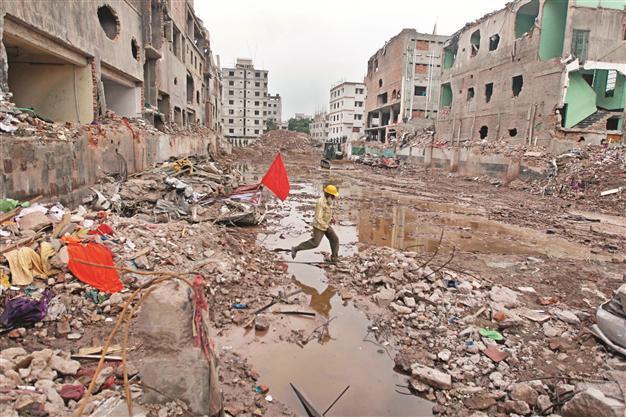US, European retailers in row over Bangladesh plants
LONDON - Reuters

A Bangladeshi rescue worker walks at the site where a Bangladesh garment-factory building collapsed on April 24 in Dhaka’s Savar district. AP photo
A trans-Atlantic divide between European and U.S. retailers over how best to respond to fatal disasters in Bangladesh textile factories split wide open on May 15, with U.S. retailers claiming their European counterparts are giving labor unions too much control over workplace safety.Some U.S. retailers, including Gap, had said they would not join the European pact without changes to the way conflicts are resolved in the courts. The rhetoric sharpened considerably when a U.S. trade group, the National Retail Federation, after calls with member companies and other groups, issued a stinging rebuke of the European-led safety accord. The U.S. solidarity did show one high-profile crack late on May 15 when Abercrombie & Fitch Co announced it had verbally agreed to join the accord.
“We are committed to Bangladesh and support industry-wide efforts to improve safety standards,” Abercrombie’s director of sustainability, Kim Harr, said in a statement. “We believe this is the right thing to do to bring about sustainable, effective change.”
The accord came together last week in the aftermath of the April 24 collapse of Rana Plaza in Savar, near Dhaka, the second high-profile disaster at a Bangladeshi textile center in recent months. The death toll at Rana Plaza stood at 1,127 this week, making it the deadliest industrial accident since the 1984 Bhopal disaster in India.
Earlier this week, apparel company PVH Corp, marketer of the Calvin Klein and Tommy Hilfiger brands, became the first U.S. company to join the accord.
Even so, the U.S. retail and apparel industry remained nearly unanimous in criticizing the compact.
Gap this week became the first of several U.S. retailers to say they would not join the European pact without changes to the way conflicts are resolved in the courts. The accord drew sharp criticism from a major U.S. retail trade group for not calling for equal responsibility from the Bangladeshi government and factory workers.
















